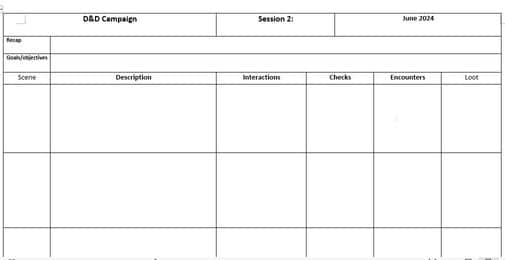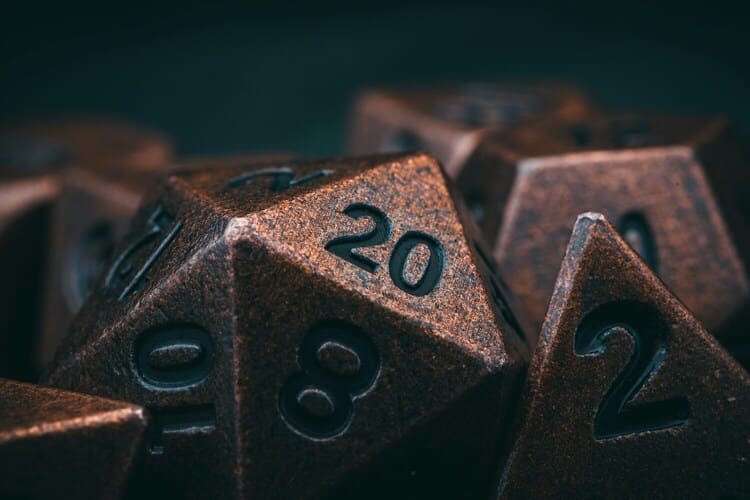Running a Dungeons and Dragons (D&D) game for the first time as a dungeon master (DM) may sound fun, but it can be pretty daunting when you begin preparing for your first game. This is especially true for DMs who want to run their first homebrew campaign. For those of you who don’t know, a “homebrew” campaign is one where the DM creates their material instead of using published works. This means the DM must write their fictional work. This includes the story, the characters, the setting, the world-building, and all the possible encounters happening in their world. The DM must also create narration for the story and dialogue for the non-playing characters (NPCs) in the game.
While D&D is a very flexible game to run and encourages improvising, managing all the rules and keeping track of notes can be challenging. Luckily, some useful tips and tricks can help new dungeon masters quickly get the hang of running a smooth and fun campaign. One way is to organize your notes in such a way that allows you to reference them quickly. By keeping notes clear, concise, and thorough, you can remember the most important details of your game while removing unnecessary fluff. To all new dungeon masters, don’t forget your D.I.C.E.!
What is D.I.C.E for Dungeons and Dragons?
D.I.C.E. is an acronym for helping organize a DM’s notes for quick reference. It’s also a checklist to cover all the important elements of running a D&D game. It stands for Description, Interactions, Checks, and Encounters. DICE follows the basic 3 step format of gameplay:
- The DM describes what happens.
- The players say what actions their characters take.
- The DM describes the result of those actions.
That’s Dungeons and Dragons in a nutshell. DICE is designed to assist DMs with remembering the important details of this 3 step process. Let’s break down the acronym and talk about how it helps us remember the important information and mechanics vital to running a good Dungeons and Dragons campaign. We will briefly examine what these terms mean, and why they are important to remember.
Descriptions
Arguably, the DM’s narration is the most important part of playing Dungeons and Dragons. Setting the tone, describing the location, the scenery, and the characters, all take a great deal of narrative skill. It takes a lot of practice for a new DM, but it keeps the players interested and intrigued. Compare the two descriptions of an event and ask yourself which you think is more interesting:
“You hold the rock in your hand and it begins to glow red. Suddenly you feel a sharp pain in your body as light and heat emit from it. Everyone hears you scream out in pain as you drop to your knees, unable to let go of the rock. You feel yourself getting weaker! A black mist begins to cover your vision. Make a con save!”
“As you hold the rock you notice it begins to glow a bright and violent red. It’s light is pulsating, and you see heat waves emitting off it like asphalt in a hot summer afternoon. You feel excruciating pain throughout your entire nervous-system. Everyone sees you suddenly throw your head back and give out a blood-curdling scream as you fall to your knees, struggling to release the rock from your grasp. With each passing second you feel the strength rapidly leaving your body! Your vision slowly begins pixilating into black. Make a constitution saving throw to see if you can stay concious!”
As you can see, the two descriptions are very different, but they both describe the same event. One uses lengthy adjectives and analogies to paint a more dramatic and detailed picture in the players’ minds. The other is short, simple, and to the point to ensure a faster pace for storytelling. No matter which description you prefer, neither is “wrong”. It depends on how you and your players want to play the game and how dramatic you want to make Dungeons and Dragons.
Why is it important? General advice for any new DMs wanting to improve their narrative skills is to read novels. It doesn’t matter what book genre you read. You should practice that narration style if it’s a good story and it’s interesting to you. Another top recommendation is to read the works of J.R.R. Tolkien, the author of The Lord of The Rings (LOTR). He is considered a master in English Literature and it’s not hard to see why. LOTR remains the most famous and well-renowned fantasy novel to date because of his skill in describing things. His narration of scenery, characters, and events is that good! It’s also worth mentioning that LOTR is the exact inspiration for Dungeons and Dragons. The Game is more or less based on that IP.
Interactions
After you have described the scene and set the stage for your players in the “theater of the mind”, the ball is now in their court. It’s the players’ turn to describe their character’s actions. What things from your description can the players interact with? Traps? Animals? Poisonous plants? Objects? NPCs? The players will inevitably say they want to interact with something, and whatever they do, it’s your job to describe the result of what happens, namely, the reaction. This is where DMs would note any “saving throws” that the characters must make with dice rolls. Every action can have an equal opposite reaction in Dungeons and Dragons, and it’s all part of the interaction.
In this section of your notes, you want to write down items, people, animals, or objects that will react to your player’s actions. This means the players may have to make a saving throw for a particular skill. This is done, normally, to evade or resist an undesired effect on the players. It is almost always something that the DM asks for players to make. For example, “Oh, you open that door without looking for traps? Make a dexterity saving throw, as deadly spikes drop from the ceiling above!” The Interactable object is the door. The saving throw is for the player to avoid the falling spikes. Remember, saving throws are something you, as the DM, ask the players to make after their characters interact with something dangerous. D&D is all about danger. It’s part of the Adventure.
Checks
First, what is a check? If a saving throw is what the DMs ask for, think of ability checks as something the players ask for and the DM will say if it’s possible. Except the DM doesn’t make the check. The players do. They are the ones who instigate this mechanic just like the DM instigates saving throws. In every scene of the game, the DM describes things the players may have the option to interact with. They must take the initiative and make an ability check, to see if they succeed. For example, the player says, “I want to hold the door closed with all my strength.” The DM understands this as a cue and may think, “The player is asking if she/he can make a strength check”. So the DM will say, “Make a strength check to see if you can hold the door shut.”
This mechanic is vital for Dungeons & Dragons because it gives the players agency. Think of ability checks like the keys needed to progress through the rooms of a house when all the doors are locked. Write down a list of these “keys”. A player who makes a successful ability check will progress the story in some way by furthering the plot or preventing a setback. Checks can be used to hold one’s breath for a long time, sneak past a guard, thread a needle through flesh to close a wound, hunt, cook, or use knowledge or intelligence to recall important information or solve a riddle. In almost all of these cases, players narrate an action for their characters that will inevitably require them to make an ability check to determine success. Players can include skill proficiency here.
Encounters
Ask any Dungeons and Dragons players what they think about when you say “encounter”. They will most likely associate that word with “combat”. And that’s not wrong. The term encounter is commonly used as a reference to a “combat encounter”. But it’s important to remember that other types of encounters exist which have nothing to do with fighting. DMs who can make this distinction are revered as excellent storytellers who think outside the box to present challenges and obstacles in new ways, making the game feel more balanced and dynamic. So an encounter can be combat, where the DM has to choose monsters for players to battle, or it can be a puzzle, where the party must work together to figure out a solution to a complex problem, sometimes in stages.
Encounters are important in Dungeons and Dragons because they add tension, action, and drama to the game. Many things must be considered when building encounters, such as challenge ratings, loot, party level, character stats, and abilities. Imagine one of your players bragging about becoming poison-immune. If you want to make them feel awesome, throw in a poison dragon for your encounter or a poisonous room-sized trap. That player will appreciate it and enjoy playing the game even more. Encounters are the part of the game where players feel like they truly shine because it’s all action and communication on their part. It takes time to build an encounter, but you don’t have to write down everything, only key details. Leave room for improvising.
Formating D.I.C.E. Into Your Notes

The main takeaway is that DICE is a useful checklist for new DMs who are creating a homebrew campaign. There’s no correct way to format DICE as a note, but that doesn’t mean it hasn’t been attempted by yours truly. When I was teaching English in Japan, I would do the unthinkable and pretend like I was working when I wasn’t. There would be incredibly slow days at work, filled with much “desk-warming” and no work to do. So I would make my Dungeons and Dragons campaign at work and I got away with it because my campaign notes were formatted on my computer just like a lesson plan for teaching English (ESL). Here’s one way I recommend to format DICE as a note.
When you look up an ESL lesson plan, it’s divided into rows on a table with headings like “Activity, Time, Teacher’s Instructions, and Students’ Instructions”. I would replace each heading with “Description, Interaction, Checks, and Encounters”. And that’s how the acronym came to be. Any co-worker or supervisor that walked by my desk praised me for working hard on my “lesson plans”. They didn’t look close enough to see it was Dungeons and Dragons campaign notes in disguise. Anyway, what I learned was that this was a neat way to organize notes, and I realized how similar being a teacher was to a DM. Planning a lesson or a campaign involves making stages filled with activities and challenges. Then you have to present it in front of people and help guide them.
Final Thoughts
For any New DMs for Dungeons and Dragons, don’t forget your D.I.C.E.! Be sure to describe everything your players see to set the stage for them. In every interaction, give a reaction to the player’s action. Give the players “a ring full of keys” and list out what checks they can make with their abilities to unlock more parts of the story. Finally, Write down the encounter type and what’s included. Again, D.I.C.E. is a checklist, but it’s also a nice way to organize campaign notes and remember all the important details you need to tell a good story and give your players agency.
For More Great Content
Are you desiring top-tier content that covers everything? From thrilling sports and intoxicating entertainment news to gaming tips and professional betting advice, Total Apex covers it all. Delve into our no-fluff articles to stay ahead of the game with the latest sports action, uncover the hottest trends in entertainment, and get the latest scoops in the gaming industry that will take your experiences to the next level.
Finally, our betting advice will give you a decisive edge over the competition and increase your odds of beating the books. Whether you’re looking to stay updated or gain a competitive edge, Total Apex is your one-stop shop for all things compelling and relevant. Don’t forget we cover Fantasy Sports, too!
Check out all our sites: Total Apex Sports, Total Apex Fantasy Sports, Total Apex Entertainment, Total Apex Sports Bets, and Total Apex Gaming. Out of the ashes of obscurity will rise a beast. Always remember to Respect The Hustle! Follow us on Twitter/X @TotalApexSports to stay informed.


